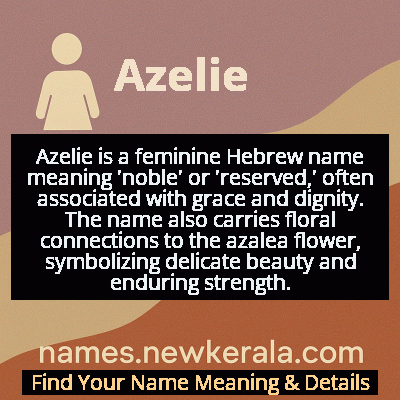Azelie Name Meaning & Details
Origin, Popularity, Numerology Analysis & Name Meaning of Azelie
Discover the origin, meaning, and cultural significance of the name AZELIE. Delve into its historical roots and explore the lasting impact it has had on communities and traditions.
Name
Azelie
Gender
Female
Origin
Hebrew
Lucky Number
4
Meaning of the Name - Azelie
Azelie is a feminine Hebrew name meaning 'noble' or 'reserved,' often associated with grace and dignity. The name also carries floral connections to the azalea flower, symbolizing delicate beauty and enduring strength.
Azelie - Complete Numerology Analysis
Your Numerology Number
Based on Pythagorean Numerology System
Ruling Planet
Uranus (Rahu)
Positive Nature
Strong sense of order, loyal, practical, and disciplined.
Negative Traits
Stubborn, overly serious, rigid, and prone to feeling restricted.
Lucky Colours
Blue, gray.
Lucky Days
Saturday.
Lucky Stones
Blue sapphire.
Harmony Numbers
1, 7, 8.
Best Suited Professions
Managers, engineers, accountants, organizers.
What People Like About You
Dependability, discipline, practicality.
Famous People Named Azelie
Saint Azélie-Marie Guérin
Religious Figure
Canonized Catholic saint and mother of Saint Thérèse of Lisieux
Azélie de Lestrange
Religious Sister
French Carmelite nun known for spiritual writings
Azélie de La Fayette
Socialite
Prominent family member known for charitable works
Name Variations & International Equivalents
Click on blue names to explore their detailed meanings. Gray names with will be available soon.
Cultural & Historical Significance
The name's floral connection to azaleas adds another layer of cultural meaning, representing natural beauty, femininity, and delicate strength. In French culture, Azelie became associated with the romantic ideal of feminine virtue combined with inner resilience. The name's usage spread through religious communities and aristocratic families, often chosen to honor both spiritual traditions and natural beauty. Today, Azelie continues to represent a bridge between religious heritage and contemporary appreciation for unique, meaningful names with both historical depth and natural elegance.
Extended Personality Analysis
Women named Azelie typically exhibit a unique blend of gentle grace and quiet strength that makes them both approachable and admirable. They tend to be deeply intuitive individuals who possess remarkable emotional intelligence, allowing them to understand others with uncommon depth and empathy. Their reserved nature often masks a rich inner world of creativity and contemplation, making them excellent problem-solvers who approach challenges with thoughtful consideration rather than impulsive action. Azelies are known for their loyalty and dependability, often becoming the steady center in their social and family circles.
Despite their gentle exterior, Azelies possess a core of resilience and determination that enables them to overcome obstacles with quiet perseverance. They value authenticity and depth in relationships, preferring a few meaningful connections over numerous superficial ones. Their natural dignity and poise often make them role models within their communities, though they typically avoid the spotlight, preferring to make their impact through consistent, meaningful actions rather than dramatic gestures. This combination of inner strength and outward grace makes Azelies particularly effective in roles requiring patience, understanding, and steady leadership.
Modern Usage & Popularity
In contemporary naming practices, Azelie has experienced a notable resurgence as parents seek unique yet traditional names with both spiritual significance and natural beauty. While still relatively uncommon, its usage has grown steadily, particularly in French-speaking regions and among families with Catholic heritage. The name appeals to modern parents who appreciate its elegant sound, rich history, and multiple layers of meaning. Current naming trends show Azelie gaining popularity as part of the movement toward vintage revivals and nature-inspired names, offering a distinctive alternative to more common floral names like Lily or Rose. Social media platforms and naming websites have contributed to its increased visibility, with many parents drawn to its combination of feminine grace, historical depth, and spiritual resonance. The name's relative rarity makes it appealing to parents seeking something unique without being invented or trendy.
Symbolic & Spiritual Meanings
Symbolically, Azelie represents the beautiful paradox of delicate strength and quiet influence, much like the azalea flower that blooms with vibrant beauty while demonstrating remarkable resilience. The name carries deep symbolic meanings related to spiritual grace, inner nobility, and the power of gentle persistence. It symbolizes the idea that true strength often manifests as patience and endurance rather than force or aggression. The floral association adds layers of meaning connected to growth, beauty, renewal, and the cyclical nature of life, while its Hebrew roots contribute themes of divine blessing and chosen status. Azelie embodies the concept that influence can be exercised through quiet dignity and consistent character rather than loud proclamation, making it a powerful symbolic representation of feminine strength that operates through grace, wisdom, and inner conviction rather than external dominance.

